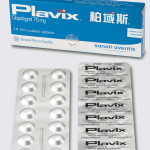 Another major blockbuster medication, Plavix, has officially lost its patent as of May 17, 2012, resulting in the second major blow to the pharmaceutical industry in just a matter of months, since the expiration of Lipitor at the end of last year.
Another major blockbuster medication, Plavix, has officially lost its patent as of May 17, 2012, resulting in the second major blow to the pharmaceutical industry in just a matter of months, since the expiration of Lipitor at the end of last year.
For more than a decade, cardiologists treating patients who have had a heart attack have routinely scribbled one drug onto their prescription pads: clopidogrel bisulfate, better known as Plavix. But, now the story of Plavix is coming to an end.
“It’s a mainstay,” said Dr. Steven Nissen, chairman of cardiovascular medicine at the Cleveland Clinic. Before Plavix arrived in 1997, aspirin was the standard treatment for preventing blood clots that led to heart attacks and stroke. Combining aspirin with Plavix, though, “tremendously improved” the results, Dr. Nissen said.
“This is one of the behemoth drugs that really defined the drug industry in the ’90s,” said Catherine J. Arnold, an analyst for Credit Suisse.
And although the loss is a major sting, Bristol-Myers is hardly the only company to face the loss of a best-selling drug: at least 19 are set to lose patent protection this year, which is expected to cost the pharmaceutical industry about $38.5 billion in lost sales, according to an analysis by Barclay’s. About 80 percent of the prescriptions written in the United States are now filled with generic drugs.
Faced with an expected influx of cheaper generic alternatives, Bristol-Myers Squibb, which sells Plavix in the United States under a partnership with Sanofi-Aventis, has said it no longer plans to actively promote the drug. Unlike what Pfizer recently attempted when Lipitor lost its patent, Pfizer spent $87 million in a post patent promotion that sought to continue to tap into the Lipitor market.
Plavix brought in $7.1 billion in net sales in 2011, accounting for a third of revenue for the year, according to Bristol-Myers filings. In the 15 years since it entered the market, Plavix generated $42.8 billion in sales for Bristol-Myers, according to IMS Health.
With the loss of patent protection for Plavix and Lipitor coming in such quick succession, “this year is a year that pharmaceutical insiders refer to as ‘pharmageddon,’ ” Dr. Nissen said.
But while Pfizer moved to retain its market share of Lipitor for as long as possible — by selling its own authorized generic version and negotiating aggressive deals with insurers and pharmacy benefit managers to match or beat the price of generic alternatives — Bristol-Myers has said it has no plans to hold onto Plavix, other than to offer a limited-time discount plan for patients who wish to continue with the brand-name drug. The company stopped running television advertisements in June.
“We expect a rapid, precipitous and material decline in Plavix net sales,” company officials wrote in the 2011 annual report. Analysts expect the price of generic alternatives to be substantially lower than brand-name Plavix.
Usually, drug prices take several months to drop because one generic company — the first to file an application with the drug agency — is granted the exclusive right to market the drug for 180 days. But Plavix is different because the company that won that right, the Canadian drug maker Apotex, forfeited its exclusive period after it flooded the market in 2006 with unauthorized generic versions of the drug.
Because Apotex lost its exclusivity, Plavix will immediately face a host of generic rivals, as seven companies have received tentative approval to market the generic drug.
